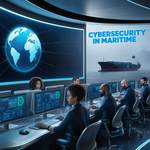Port Authority
A port authority operates ports and other transportation infrastructure for a special-purpose district. Whether operated directly by the government or in cooperation with government agencies, North American port authorities are public entities and are governed by a board or commission. Most port authorities are financially autonomous. Port districts may also operate shipping terminals, airports, railroads, and irrigation facilities. The port authority often owns land, dictates fees, and collects taxes.

MPA, Dalian Maritime University Renew Partnership
The Maritime and Port Authority of Singapore (MPA) and Dalian Maritime University…

Wilhelmsen Port Services, Yinson GreenTech & R W Marine Services Sign MOU
Wilhelmsen Port Services has signed a Memorandum of Understanding (MOU) with Yinson…
Singapore Launches World-First in Cybersecurity Training
New MariOT testbed aims to strengthen shipboard cybersecurity, train next-gen maritime…

Singapore and India Partner on Maritime Digitalization and Decarbonization
Singapore and India have signed a Letter of Intent (LOI) to cooperate on maritime…

Singapore Marine Fuel Sales Drop
Singapore marine fuel sales fell to their lowest in 20 months in February, official…

Singapore Sets New Standard for Methanol Bunkering
Singapore, the world’s largest bunker hub for ships, has launched a new standard for methanol bunker

B30 Marine Fuel Tanker Transport OKd in Singapore
Licensed bunker tankers operating in the Singapore port will be allowed to carry and deliver up to 3

Steelpaint Inks Deal to Refurbish Emden Lock
Emden’s Great Sea Lock (Große Seeschleuse) is to be protected from corrosion with…

Chemical Tanker Boarded in Singapore Strait
The Maritime and Port Authority of Singapore (MPA) has reported an unauthorized boarding…

Ammonia Fueled Ammonia Bunkering Vessel Design Granted AiP
ClassNK has issued an Approval-in-Principle (AiP) certificate for an ammonia fueled…

Bilbao Port Authority Showcases Hydrogen Infrastructure
The Bilbao Port Authority participated in the 1st Conference of the Chambers of Commerce…

Canada Invests Over $17M to Modernize Halifax Port Authority's Infrastructure
The government of Canada has allocated $17.4 million to accelerate the development…
The vast, open oceans have long served as conduits for commerce, adventure, and exploration. However, along with the grandeur of maritime activities comes inherent risks, one of which is the specter of armed robbery at sea. Also known broadly as maritime piracy, this menacing threat envelops not just the economic marine highway but also the lives and safety of those who navigate it.

As the maritime industry undergoes a digital transformation, the integration of advanced technologies such as automation, Internet of Things (IoT), and big data is revolutionizing operations. However, this digital shift also brings significant risks, particularly in the realm of cybersecurity. Protecting maritime assets, systems, and data from cyber threats has become a critical priority as the industry becomes more connected and reliant on digital infrastructure.
Maritime piracy in Southeast Asia has been a persistent and complex issue with deep historical roots and contemporary relevance. This region, characterized by its extensive coastal areas, strategic maritime routes, and bustling trade activities, has frequently been targeted by pirates. The issue of piracy in Southeast Asia presents economic, security, and governance challenges that require regional cooperation and coordinated efforts.
The Horn of Africa, strategically positioned at the nexus of global trade routes, has long faced the specter of maritime piracy. The waters off Somalia, in particular, have been notorious for piracy incidents that have disrupted international shipping, imperiled seafarers, and prompted multinational military responses. This region's unique combination of socio-economic, political, and geographic factors has engendered a breeding ground for modern piracy, posing complex challenges for the international community
Shipbuilding is the construction of ships, which takes place in a specialized facility known as a shipyard. Shipbuilders, also called shipwrights, are workers which specialize in vessel construction and repair. The construction of boats is called boat building.













